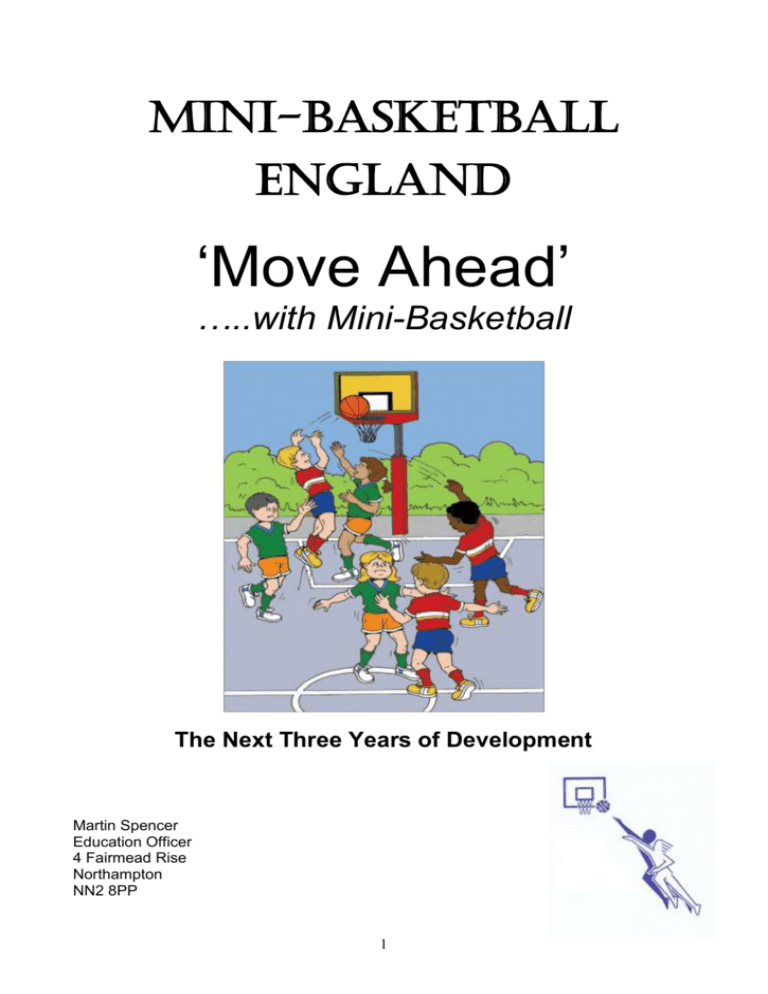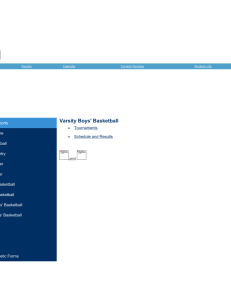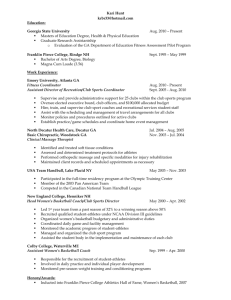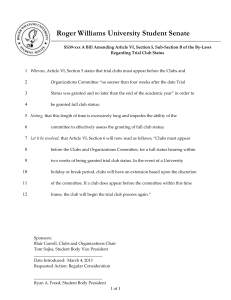`Move Ahead`... - Mini
advertisement

MINI-BASKETBALL ENGLAND ‘Move Ahead’ …..with Mini-Basketball The Next Three Years of Development Martin Spencer Education Officer 4 Fairmead Rise Northampton NN2 8PP 1 Revised February 2011 Aims In partnership with England Basketball and other sports organisations, individuals and groups facilitate the development of Mini-Basketball in primary and middle schools as well as in the local community. To support the provision of a range of opportunities for boys and girls to enjoy playing MiniBasketball in a friendly and caring environment. To increase the number of people playing, officiating and involved in basketball. Objectives Mini-Basketball England will support and develop: A participation framework which ensures equality of opportunity for young people of 11 years and under to have fun playing Mini-Basketball Mini-Basketball activities that allow children to reach their full potential Activity programmes that help children adopt a healthy life style allowing them to be regularly involved in sport Out of school hours and community clubs Activities that allow young people of all abilities to participate in Mini-Basketball. The concept of ‘Fair Play’ Opportunities in leadership, coaching and officiating for teachers, other adults and students The link between key stages 2 and 3, effecting the smooth transfer from Mini-Basketball to Basketball 2 Development Programme 1. Raising the Awareness of Teachers Promoting Teacher Awareness Workshops & Training for teachers, coaches and other adults in both primary and middle schools in England. Teachers, Coaches and adults other than teachers from a cluster or family of primary schools will be invited to each workshop or training session, Teachers will be encouraged to provide opportunities for children in National Curriculum Physical Education Key Stages 1 & 2. The programme of each Teacher Awareness Workshop(TAW) could include: a presentation of how to use Mini-Basketball in physical education lessons an introduction to safe practice a practical experience of the skill-based activities to show their progression into an invasion game. a visual presentation of the equipment, balls and goals and how to access funding to purchase appropriate equipment. an introduction to the available support facilities to include: Mini-Basketball England – advisory services, teacher tuition & children’s ‘experiences’, e.g. Fun ‘n’ Games festivals & competitions and access to strategies to promote health education. School Sports Partnerships Local Authority Sports Development Officers Local Basketball Clubs Coaches working in Schools for each participant: Notes of the Workshop. Personal Participation Certificate. the promotion of the reference manual ‘Mini-Basketball – A Guide to Teaching and Coaching’ by M L Spencer (International Edition). This programme would be delivered by a corps of trained and qualified tutors who have attended a Val Sabin Publications & Training Licensed Trainers Course delivered by Martin Spencer, MBE Education Officer. 3 2. Promotion of Take Six Mini-Basketball in Primary Schools ‘Take Six Mini-Basketball’; a new game, designed to introduce children to organised competition in a caring and friendly environment will be introduced through the School Sport Partnerships ‘Take Six Mini-Basketball’ will provide the link between curriculum Mini-Basketball and activities in school and community clubs and prepare the teachers, coaches, helpers AND CHILDREN, for the full Mini-Basketball game and transfer to Basketball at 12 years of age. Take Six Mini-Basketball will be promoted by the staging of a series of Take Six Mini-Basketball Development days to be organised in partnership with: 1. School Sports Partnerships 2. Clubmark Basketball Clubs 3. Teacher Training Establishments The development days will be the catalyst for a local Take Six Mini-Basketball programme to be established in the local primary schools. 3. Train to Teach Mini-Basketball Programme Promoting the Train to Teach Mini-Basketball National Development Programme Training courses for students undertaking teacher training in conjunction with local primary schools. The Train to Teach Mini-Basketball programme to include: 1. Student Teacher Awareness Workshop (STAW): A two hour session to suit the host college/school and open to all the students/teachers from a Teacher training course and a group of primary schools. The session is a practical exploration of the many mini-basketball activities that can be integrated into P.E. Lessons or during an out of school hour MiniBasketball Club. 2. A half day or full day course similar to a STAW, as described above, but a valuable opportunity for Students/Teachers to experience the activities delivered at a STAW with an extended course to cover introducing playground activities and Take Six MiniBasketball. 3. Student Teacher In-class Development: Develop mini-basketball knowledge & understanding by observing practical class activity. Tutor works with students/teachers with children in classes taking PE lessons throughout a school day to demonstrate how minibasketball is an exciting curriculum activity. The school can select the classes from year 1 to year 6 according to the school requirements. 4. Take Six Mini-Basketball Festival: (Can be organised in conjunction with a Student Teacher Training Course). A special mini-basketball event for one school or a group of primary schools held at the host college. Children from one or several schools come together with their teachers for a sports festival at the College. The event will be organised according to the recommended guidelines and will include a range of challenging mini-basketball activities followed by games as required. The students/teachers assist in the delivery of the event. 4 5. Mini-Basketball Coach Award: A 10 hour course normally organised over two days for potential coaches and qualified teachers. Usually requires 12 or more candidates who should have previous knowledge of basketball. They will be expected to complete assignments as part of home learning. 4. Advisory Service for Accessing Equipment Dialogue with each participating school recommending: - fixed and mobile goals at the appropriate heights. - the importance of each school having a minimum of Infant school (Key Stage One) - size 3 balls, one for each child in class. Primary & junior (Key Stage One & Two) - size 3 & 5 balls, one for each child in class. Both schools and clubs would be given the best available advice on accessing funding for the purchase of equipment and to support tuition and coaching. 5. Promotion of Mini-Basketball Festivals Organisation & management of regular ‘out of school hours learning’ of Mini-Basketball ‘Fun ‘n’ Games’ Festivals for selected children from the local family of schools to include: - Mini-Basketball fun activities A series of games Opportunities for children to officiate Festivals to be led by appointed Mini-Basketball expert, assisted by teachers and young leaders using an approved programme. Regular sessions for the development of skills and their employment in a range of games, appropriate to age and achieved development stage of the boys and girls to be led by : - Teachers - Assisted by other adults and senior students of secondary schools and colleges (Young Leaders) Local Mini-Basketball coaches A regular competitive experience designed to suit the teachers of each School Partnership or family of schools These can take the form of: 1) A Festival with elements of coaching; learning the skills of playing & officiating and games in mixed school teams or school teams. 2) A tournament with an eventual winner or 3) A fixture programme e.g. Central venue fixture programme Home and away fixture programme Informal gathering of 3 schools at one of the schools – rotate hosting throughout the year. Participation by selected players in international Mini-Basketball Jamborees when invited. 5 6. Staging Mini-Basketball One-Day Festivals Staging of annual one-day Festival in a public forum for schools and clubs - Central venue, in prominent location in community. - Several courts. - Colourful environment – banners, flags, music, trade stalls, refreshment outlets. - High profile P.R. promotion with local media. 7. Supporting the School Sport Partnerships Programme & Other Alternative Local Primary School Sports Providers Develop a close and cooperative liaison with the School Sport Partnerships and other local primary school sports providers to affect the delivery of the shared objectives, particularly in introducing a Take Six Mini-Basketball programme for local schools. 8. Creation and Development of Mini-Basketball Clubs Develop a programme of activities to encourage the school clubs to ‘grow’ into independent Mini-Basketball clubs often based at the school. The club could form the basis of a Community Basketball Club as the children and their parents move through the age-groups. Cooperation between school and club should include: - 9. Regular support of each other’s programmes. Equality of access to equipment Assistance with teaching & coaching Encourage and assist ambitious clubs to participate in on-going competitive experiences locally, regionally and internationally as appropriate to their stage of development. Promote the importance of children being regularly involved in sporting activities, through Mini-Basketball Publicise & promote the following opportunities for children to play Mini-Basketball: 10. Playing at home. Formally and informally at school. As a member of a Mini-Basketball club. As a member of a recognised youth organisation e.g. scouts, guides, mixed clubs. On recreation areas. Transfer from Mini-Basketball to Basketball 6 Encouraging all schools that provide basketball for pupils in Year 7 to adopt the new modifications of the height of the ring from 2.60 m to 3.05 m, whilst still using the size 5 ball. Promote the use of Mini-Basketball, A Guide to Teaching & Coaching at the beginning of Key Stage Three Encourage the formation of Basketball Clubs at secondary school or within the local community. 11. Promotion of Player Improvement Experiences 12. Promotion of local competitions, adopting a style decided by the participating schools. Promotion of coaching festivals – residential & non-residential using the services of qualified Mini-Basketball coaches and talented adult players. Participation in international school & club tournaments as invited. Encourage the Concept of Fair Play Promote the concept of ‘Fair Play’ at every opportunity. Provide regular opportunities for children to officiate games – referee, score and timekeep. Promote the Mini-Basketball Officiating Award. 13. Provide opportunities in leadership, coaching and officiating for teachers, adults other than teachers and students. Organise and deliver regular training for tutors to lead Mini-Basketball education initiatives. Promote the Licensed Trainer’s Programme and the Mini-Basketball Coach Award. Encourage the participation of young people in the support of teachers and coaches delivering Mini-Basketball activities –Mini-Basketball Leaders Award Adopting strategies to cooperate with School Sports Partnerships through the Partnership Development Managers, School Sports Coordinators and the School Primary Link Teachers 14. Facilitate the formation of Mini-Basketball Clubs and Mini-Basketball Sections of Basketball Clubs Promote the formation of clubs providing regular opportunities for children to play MiniBasketball in a friendly and caring environment Support the recruitment and training of administrators, managers, coaches and young leaders, guiding them to adopt strategies to access resources for the further development of the clubs and the participating individuals. Encourage recognised Youth Organisations and Local Sports Development Units to include Mini-Basketball in their children’s sports programmes. 7






